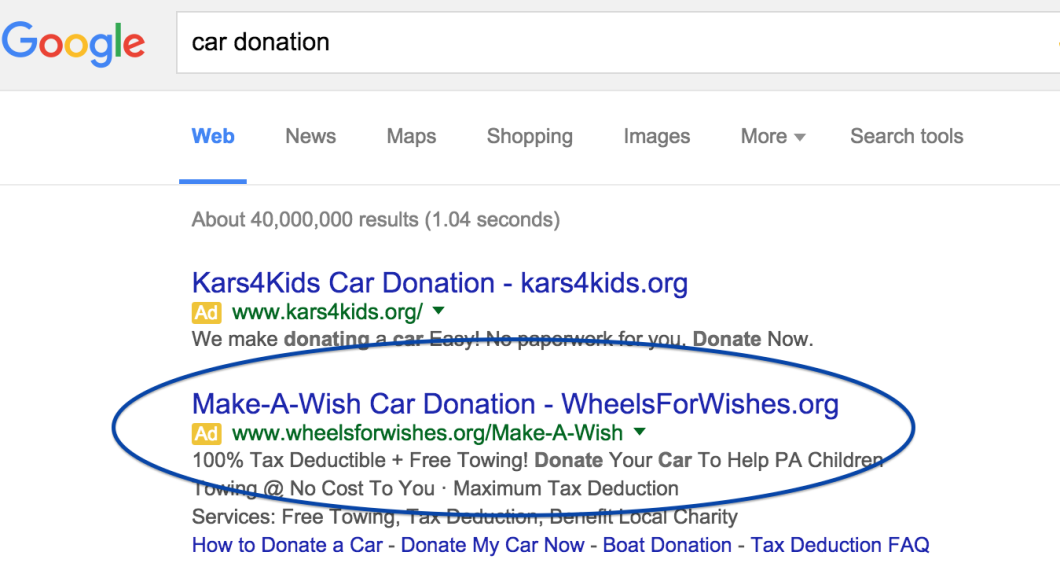Report: “Wheels For Wishes” Charity Misled Donors About Make-A-Wish Donations Image courtesy of Minnesota AG Lori Swanson says her office has received a number of complaints from people who donated to Wheels for Wishes believing that a large portion of their donation would benefit the Make-A-Wish Foundation. According to Swanson's report, only about 20% of that money went to the foundation, while millions went to for-profit companies owned by the Wheels for Wishes' founders.

Minnesota AG Lori Swanson says her office has received a number of complaints from people who donated to Wheels for Wishes believing that a large portion of their donation would benefit the Make-A-Wish Foundation. According to Swanson’s report, only about 20% of that money went to the foundation, while millions went to for-profit companies owned by the Wheels for Wishes’ founders.
According to a compliance report [PDF] released today by Swanson’s office, Minnesota-based CDF received more than 144,000 donated vehicles and brought in $108 million in revenue between 2011 and 2014.
But only about 20% of that money ever made its way to the Make-A-Wish Foundation chapters that were supposed to benefit.
During that same amount of time, more than 30% of CDF’s revenue was spent on advertising.
The two men who founded and run CDF, William Bigley and Randy Heiligman, are also the only two owners a company called National Fundraising Management, Inc. (NFM), whose only client is CDF. Additionally these two gentlemen own 100% of another for-profit company called Metro Metals Corporation which happens to be in the car auction and scrap metal business.
Together, these two businesses received nearly $36 million from CDF between 2011 and 2014 — a full third of the charity’s gross revenue.
Though the figures are redacted in the compliance report, the AG’s office says these operations “appears to be highly profitable for Mr. Bigley and Mr. Heiligman.”
In 2013, the IRS criticized Bigley and Heiligman for being on CDF’s board of directors and owning two for-profit companies that directly profited from the charity. At the time, the IRS noted that a charitable organization should not serve as a “lead generator to get business for the founders’ for-profit companies.”
After the IRS raised questions about the legitimacy of CDF’s non-profit status, Bigley and Heiligman (along with the latter’s spouse, and a lawyer who just happens to represent NFM and Metro Metals), stepped down from the board. But the compliance report contends that “The CDF board of directors thereafter immediately delegated day-to-day management responsibility for running CDF to Mr. Bigley and Mr. Heiligman.”
Of course, who else could do the day-to-day running of the company as CDF has no employees and no permanent office. According to the company’s financial statements, management of the organization is outsourced to, you guessed it, NFM.
The lawyer who stepped down from the CDF board continued to “provide services typically provided by treasurer and secretary of CDF,” and his firm even represented CDF in responding to the attorney general’s investigation.
Though CDF’s contract with Make-A-Wish allows the foundation to audit CDF’s books, Make-A-Wish never took that opportunity until after learning about the Minnesota attorney general’s investigation.
When Make-A-Wish did audit CDF in 2015, it discovered a number of red flags, like the fact that “one of the main auction houses used to auction off cars [is] owned by parties related to CDF,” or that invoices from NFM to CDF for expenses lacked detail about what exactly was being billed for.
For example, there were no invoices found for the $1 million/month in advertising fees paid by CDF to NFM. For 2014 and into the first quarter of 2015, CDF paid a total of $29 million to NFM without proper invoices being used.
“[I]f CDF were an independent organization, the amount of detail would be insufficient to understand or verify exactly what services were rendered, or why the amount being charged is appropriate,” reads the Make-A-Wish audit.
The foundation auditor explained that an outsider looking at this operation and seeing “such a significant amount being removed from a charity by a related, for-profit organization” might get the idea that the for-profit company is receiving something more akin to a “cut” of the proceeds instead of a legitimate management fee.
Then there’s the issue of CDF, through its Wheels for Wishes brand, using the Make-A-Wish name in its marketing.
According to Minnesota state law, “No charitable organization soliciting contributions shall use a name, symbol or statement so closely related or similar to that used by another charitable organization…that the use thereof would tend to confuse or mislead the public.”
That same law also prohibits charities in Minnesota from any deceptive practice in connection with any charitable solicitation, “including any such actions or omissions designed to confuse or mislead a person to believe that such organization is another organization having the same or like purposes.”
And yet, the attorney general’s office says that CDF’s use of the Make-A-Wish brand is confusing and misleading, especially since Make-A-Wish only receives a small portion of the donation.
In fact, the compliance report claims that in 2013 one local Make-A-Wish chapter asked CDF to stop using the phrase “Make-A-Wish Car Donation” in its ads because “it was misleading as donors were not donating directly to Make A Wish.”
The report notes that a Google search for something as simple as “car donation” not only brings up Wheels for Wishes, but directly references Make-A-Wish in the paid search results. We tested this today and confirmed that the results still show up this way:

Swanson’s office says it has received a number of complaints from Minnesota residents who believed they were donating directly to Make-A-Wish only to find out otherwise. Many of these donors say they were confused by the use of the Make-A-Wish name and logo in the advertising.
Additionally, the report claims that donors receive inconsistent — and inaccurate — information about how much of their donation would benefit Make-A-Wish.
One donor says she was told it was between 50-70%, while another said that a company rep told him that all the money from the sale of his car would go to Make-A-Wish.
Another bit of misinformation: CDF is accused of telling donors that they can deduct at least $500 from their taxes for their donated cars. But that’s only true if (A) the donor itemizes their tax return, which fewer than 1/3 of taxpayers do every year, and (B) the car is worth more than $500. There are a lot of cars out there not worth more than a couple hundred dollars.
Some donors say they were told that there would be an “automatic $500 tax deduction for donating,” while others said they were promised “preliminary” receipts indicating “you have a minimum of $500 to deduct from your taxes for charity.”
In its defense, a rep for NFM tells the Minneapolis Star-Tribune that “National Fundraising Management provides great value to donors and our charity partner, Car Donation Foundation… The attorney general’s compliance report fails to recognize the significant marketing, operational and compliance costs involved in any car donation program, which Car Donation Foundation pays National Fundraising Management to assume.”
This is not CDF’s first go-around with a state regulator. In 2014, the South Carolina secretary of state put the charity on its annual “Scrooge List,” while it made the Oregon attorney general’s “Worst Charity List” for the year.
Want more consumer news? Visit our parent organization, Consumer Reports, for the latest on scams, recalls, and other consumer issues.

